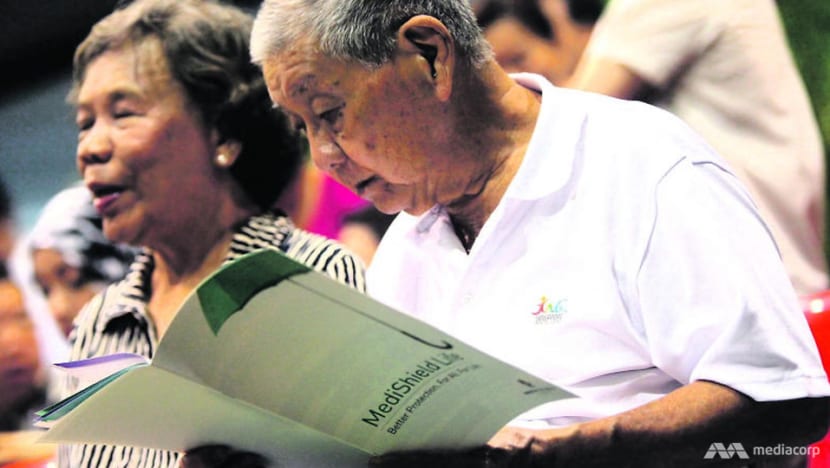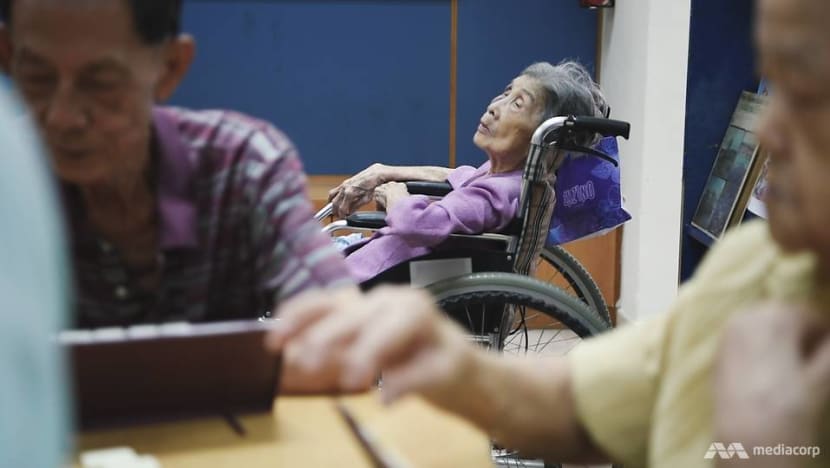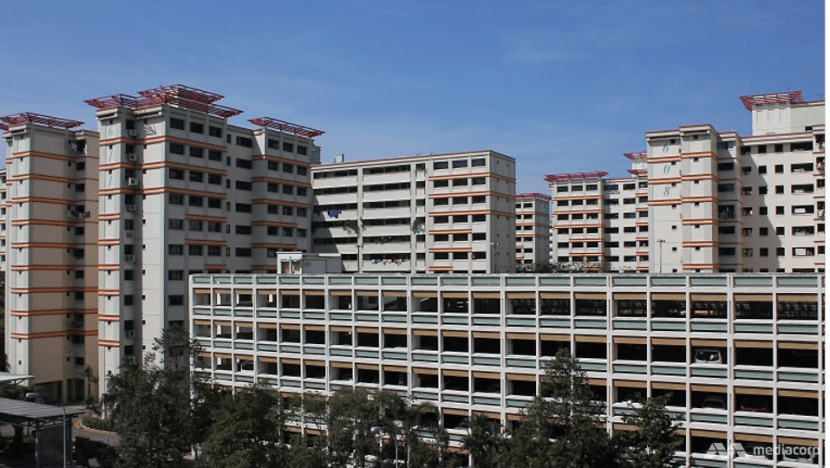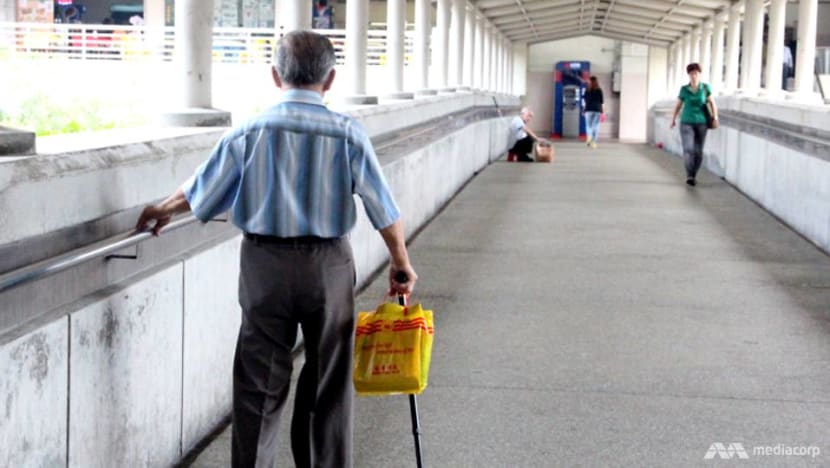commentary Commentary
Commentary: Still paying off your housing loan at 65? Five rules to a happy retirement
There are five axioms to live by in ensuring retirement adequacy, says financial consultant Patrick Chang.

A customer withdraws cash from an automated teller machine. (File photo: AFP/Roslan Rahman)
SINGAPORE: Guess how many seniors are still paying off their housing loan?
Hard to imagine isn’t it?
But according to a Credit Bureau Singapore study in 2014, the number of Singaporeans aged 65 and above still servicing outstanding mortgage loans numbered over 15,000 – triple the figure in 2008.
It’s harder to imagine how these seniors will achieve retirement adequacy. Nearly three in 10 Singaporeans expect a lot less income in retirement than they do today, according to a 2015 Global Ageing Institute study.
The same survey found that a large number of Singaporean workers expect to receive benefits from the Central Provident Fund to fund their retirement expenses.

So it is no wonder why most Singaporeans were anxious over news about the CPF payout age, when many were not sensitised to the opt-in nature of the scheme which allows recipients to receive payouts beginning at 65, or automatically receive payouts at 70.
Manpower Minister Josephine Teo nonetheless acknowledged that workers appear to be more concerned about being able to work longer and save more in Parliament last month.
More recently, she revealed that a survey done by the Manpower Ministry suggested that over half who withdraw their CPF accounts leave it in a bank account.
READ: CPF Board can do better in communicating messages on payouts - Josephine Teo
This episode shone a spotlight on Singaporeans’ concerns over retirement, where some readers asked what more could be done to secure their retirement finances and maximise returns on their money, instead of fixating whether we get our CPF at 65 or 70 or somewhere in-between.
1. TACKLE YOUR OUTSTANDING DEBT
How about ensuring you’re debt free first and foremost?
Debt can exert a heavy burden and lead to emotional stress, affecting our well-being and straining family ties. It also represents a huge opportunity loss because the interest paid could have been put to good investment use.
My advice would be to get rid of all outstanding debt, and prioritise those with the highest interest rates. At up to 26 per cent per annum, credit card bills can snowball into a huge debt.

A simple calculation: S$10,000 on a credit card can be settled in 5 years with a S$300 monthly repayment, but this incurs almost S$8,000 of interest.
It’s not just S$8,000 that you could have spent.
If you had kept this $8,000 invested, with 4 per cent annualised returns, your money would have grown to nearly S$9,300 – meaning more money to spend each month or more retirement income to spread over a longer period.
This principle should apply to all aspects of our finances. Even for those of us who might secretly congratulate ourselves for being thriftier, have we managed to pay off our housing loans?
Eliminate your outstanding debt first because it will impact how much you have left over each month to spend.
2. STAY HEALTHY, GET INSURED
How about ensuring your healthcare needs are taken care of?
At age 65, we should have appropriate health insurance coverage.
Falling sick can be very costly so it is no wonder Singaporeans see affordable, quality healthcare as a key concern, according to a survey by government feedback agency REACH in January.
In recent years, the Government has rolled out national healthcare insurance schemes to pool risk.
READ: In old age, health is not merely the absence of disease, a commentary

All Singaporeans will have Medishield Life to help with large hospitalisation bills and for those born after 1980 or have opted in, Careshield Life, which aids with disability needs. Part of your average hospitalisation bill for a public hospital, which ranges from S$970 to S$6,389 (according to data.gov.sg) depending on your stay, the procedure and ward you choose, can be suitably covered.
READ: Laugh at enrolling in ElderShield at 30? It should be sobering news, a commentary
But what about the pre- and post-hospitalisation follow-ups? You might want to upgrade to an integrated shield plan, which offers riders covering these expenses.
Those of us more risk averse may also prefer riders that cover the full hospitalisation bill including deductibles (subject to a mandatory 5 per cent co-payment imposed just last year to avoid over-consumption of medical services).
But having a hospital plan is not the end of the story.
Even after getting out of the hospital, recovering from a critical illness may mean losing the capacity to work altogether.
A critical illness policy assures you of a full sum to be paid out should you ever be diagnosed, not to be confused with a life insurance plan which pays out after the policyholder has passed on.
These insurance plans help to lessen the financial burden for retirees and their family, while providing income support for your care needs and dependents during your recovery.

READ: The role reversal between parent and child, as ageing takes a toll on families, a commentary
As seniors are more prone to falls, which can debilitating at that age, a personal accident policy can also help to reduce out-of-pocket outpatient expenses.
Getting the right insurance coverage can go a long way in ensuring a huge medical bill doesn’t burn a hole in your pocket and scuttle other life goals you may have.
3. KEEP YOUR FINANCES IN CHECK
How about ensuring your expenditures are kept in check?
Sometimes the most important advice is the simplest: Spend on needs and not wants.
I cannot stress enough the importance of simple financial discipline. Categorise your expenses. Set a specific target or limit on each pot of money. Keep to that limit.
For example, if you plan to spend 10 per cent of your allocated retirement fund on food each month, don’t splurge on more.
The most difficult thing to do may be to differentiate between needs and wants. Do you really need your car? Do you really need a foreign domestic worker?
The recent proliferation of affordable and on-demand cleaning, care and ride-hailing services may make getting such help on an ad hoc basis more financially sensible than owning a car or employing a full-time foreign domestic worker.
And do you really need that huge house after all the children have left the nest?
READ: The Lease Buyback scheme can give singles more housing options, a commentary
Downsizing to a smaller apartment not only means you have smaller maintenance bills and less cleaning-up to do, it also allows you to unlock the equity in your old home – which can go a long way to fund new expenses and comforts.

4. HAVING A STEADY STREAM OF INCOME
How about having a diversified stream of income?
One of the major concerns retirees have is outliving their savings. A Nielsen survey in 2015 found that almost seven in 10 feel that their savings will not last through retirement.
Ensuring a consistent flow of income is crucial. Diversifying your portfolio to invest in different schemes can additionally augment your retirement income
Sure, you play the stock market. But the key to successful investment is time. It is not about timing the market, but how much time you leave your money in the market.
Reacting to market sentiments and making emotional investment decisions are both bad for investments, Warren Buffet once said, whereas investing in long-term funds can bring significant compounded returns.
For someone preferring less risky investments and with more pay-out certainty, it’s worth considering getting a retirement income plan.
This usually takes the form of an endowment policy sold by insurance companies, in which policyholders contribute either a regular amount for a designated time period or a lump sum. The pay-out age is timed to coincide very close to your retirement age, so that you can receive a guaranteed chosen amount, for up to 20 years.
The guaranteed pay-out provides a source of savings for retirees and usually can be structured to take the form of one lump sum or monthly payouts. There is also a projected non-guaranteed terminal pay-out when the policy matures - a bonus.
Your CPF Life fortunately pays out annuities for life, regardless of how long you live, providing a basic assured income.
5. RETIRE FROM WORK NOT LIFE
The irony is that many of our rising concerns about retirement adequacy stems from a higher average life expectancy which will reach 85.4 in 2040 and possibly even longer after, with advances in nutrition, care and medicine.

READ: You can still retire at 40, even with a longer life expectancy, a commentary
Retiring from work shouldn’t mean we retire from life. In the same vein, thinking about retirement adequacy must go beyond dollars and cents to consider what a life well lived entails.
It can be an opportune time to seek out new purposes and fulfil longstanding passions, to serve the community in a fresh role or start a new hobby.
It can mean time for ourselves and time for purposeful activities that give our days meaning, but the important thing is to exercise agency to chart a new, positive chapter in our lives.
Studies have also shown that those who keep active and engaged in retirement are happier and enjoy better health and well-being.
The last thing we want is for financial concerns to derail those plans. Planning early can give us the confidence to turn the page when we retire.
Patrick Chang is a financial consultant and author of The A To Z Guide to Retirement Planning.












